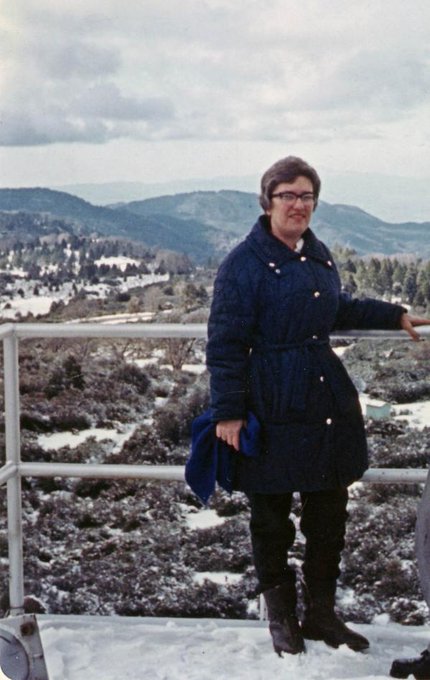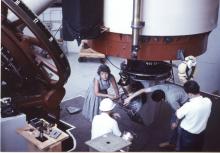Updated
Photo: Vera Rubin was the only astronomy major to graduate from Vassar College in 1948. (Supplied: Vassar College Archives and Special Collections)
Pioneering astronomer Vera Rubin, who helped find powerful evidence of dark matter and some say was deserving of a Nobel Prize, has died aged 88.
Dr Rubin's son Allan, a geosciences professor at Princeton University, said his mother, who had dementia, died on Sunday night of natural causes at an assisted living facility in Princeton, New Jersey.Dr Rubin had used galaxies' rotations to discover the first direct evidence of dark matter in the 1970s while working at the Carnegie Institution in Washington.
Dark matter, dark energy and dark radiation
- Matter — the stuff that makes up everything from galaxies and planets to us — only accounts for 5 per cent of the universe's energy
- We can't see the other 95 per cent — hence 'dark' — but it's real because we can see the effect it has on matter
- 25 per cent is dark matter — it makes stars rotate around galaxies faster than can be accounted for with regular matter
- The rest (70 per cent) is dark energy, which pushes out against gravity making the universe expand faster and faster.
- Dark radiation is a new type of a subatomic particle such as a neutrino. It would be in the 5 per cent of normal stuff but not normal and not something seen... yet
The discovery contradicted a law of physics that said the greater mass in the centre, such as dust, stars and gas, meant it should move faster than the edge, where there was less mass.
The explanation was a halo of dark matter around the galaxies that spread mass throughout the galaxies.
Dark matter is thought to make up about 27 per cent of the universe, while dark energy accounts for about 70 per cent.
Both are invisible and have never been directly observed, but inferred through work by Dr Rubin and other astronomers and physicists.
Normal matter, including stars, planets and gas, is thought to constitute less than 5 per cent of the universe.
Scientists better understand what dark matter is not, rather than what it is.
But they have discovered a small part of dark matter is made of neutrinos — tiny, fast-moving particles that do not really interact with regular matter.
Rubin 'deserved Nobel Prize'
University of Washington astronomer Emily Levesque told Astronomy Magazine in June that Dr Rubin deserved the Nobel Prize, because the discovery of dark matter had revolutionised astronomy and the concept of the universe."[The will of Alfred Nobel, the founder of the prizes] describes the physics prize as recognising 'the most important discovery' within the field of physics," Dr Levesque said.
"If dark matter doesn't fit that description, I don't know what does."
Dr Rubin's scientific achievements earned her numerous honours, including becoming the second female astronomer to be elected to the National Academy of Sciences.
Photo: Scientists better understand what dark matter is not, rather than what it is. (NASA: Reuters)
She also received the National Medal of Science from former US president Bill Clinton in 1993, "for her pioneering research programs in observational cosmology".
Dr Rubin's interest in astronomy began as a young girl and grew with the involvement of her father, who helped her build a telescope and took her to meetings of amateur astronomers.
She was the only astronomy major to graduate from Vassar College in 1948.
She earned a master's degree from Cornell University and a doctorate from Georgetown University in Washington.
Members of the science community posted tributes to Dr Rubin on Twitter, some lamenting that Dr Rubin has not won a Nobel Prize.
Vera Rubin, the Carnegie scientist who confirmed the existence of “dark matter,” has died http://carnegiescience.edu/node/2124
Very sad to hear of #VeraRubin's death. Every year, many of us in physics hoped this might finally be the year she got her Nobel Prize. Alas https://twitter.com/coreyspowell/status/813434943514804225 …



No comments:
Post a Comment